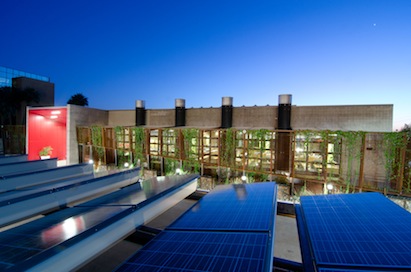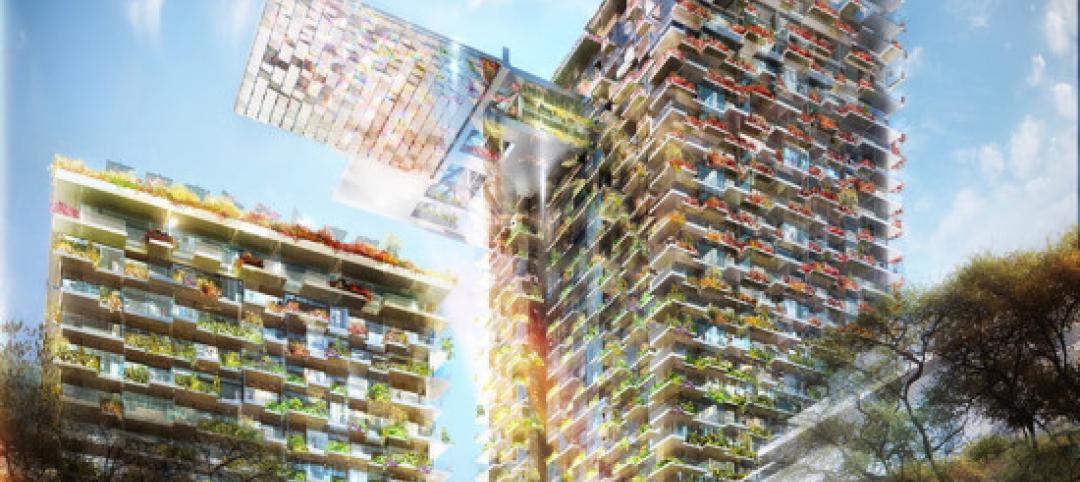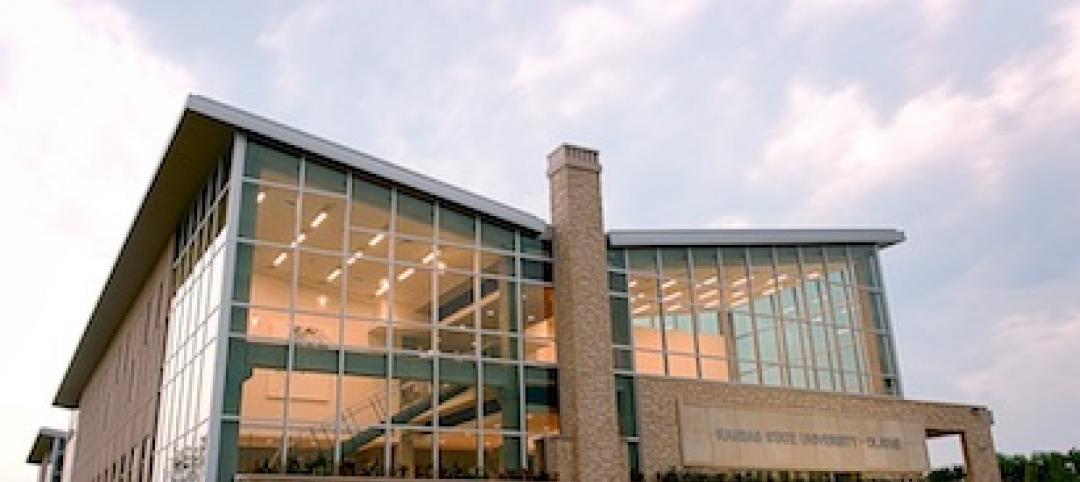Phoenix --The new Phoenix Regional Office of DPR Construction, designed by SmithGroupJJR, has been officially certified as a Net Zero Energy Building by the International Living Future Institute (ILFI). It’s the largest building in the world to achieve Net Zero Energy Building Certification through the Institute to date.
SmithGroupJJR designed the comprehensive renovation of the windowless, 1970s concrete block building, transitioning it into a model for sustainable adaptive reuse.
Located at the corner of 44th and Van Buren in a once declining area of Phoenix, the 16,533-square-foot storefront had most recently operated as an adult-themed boutique before standing vacant for three years. The eyesore building was purchased by DPR Construction, a national general contractor and construction manager, which was looking to build a highly-efficient, sustainable workplace and reaffirm its commitment to better the community in which it works.
Today, DPR’s new building is an ultra-energy efficient and modern workplace that’s embraced by its employees and the community.
“Many building owners may think it’s impossible to turn an aging, neglected building into something highly sustainable – especially in an extreme climate like Phoenix. But that’s precisely what we’ve achieved,” said Mark Roddy, AIA, LEED AP BD+C, SmithGroupJJR design principal. The entire project was completed in less than 10 months and is the first Net Zero Energy Building SmithGroupJJR has designed.
Net Zero Energy facilities integrate a combination of energy-producing technologies like solar and wind, and implement efficient HVAC and lighting systems to reduce a building’s overall energy usage. To achieve Net Zero Energy Building Certification, a facility must demonstrate a net energy consumption of zero over the span of one year.
SmithGroupJJR incorporated a range of advanced, sustainable design solutions to achieve Net Zero Energy consumption, such as:
— An 87-foot solar chimney enables a passive cooling system, releasing hot air out of the building while drawing cooler air in.
— Nearly 90 operable windows throughout the building work in tandem with the energy monitoring system to open and close based on indoor and outdoor temperatures.
— Eighty-two solar optical tubes, Solatubes harness light from rooftop domes and bring it into the workspace, nearly eliminating the need for artificial lighting.
— Twelve 8-foot diameter Big Ass Fans® circulate air flow throughout the office.
— A “vampire” switch cuts off 90 percent of plug loads, which would otherwise continue to draw power at night when the building is unoccupied.
— Four evaporative Shower Towers direct water-cooled air inside, also helping to regulate building temperatures.
— Producing power for the building is a 78.96 kW photovoltaic-covered canopy over half of the parking lot. The system is capable of generating enough power to offset the building’s annual energy usage and is critical to allowing the facility to achieve Net Zero energy consumption.
Tracking the building’s energy production and consumption in real time is an online building dashboard, prominently on display in the office’s reception area.
The new office building for DPR employees working in Phoenix is more than a sustainability powerhouse. Inside, SmithGroupJJR designed a “workplace of the future” environment, where employees share a common, open work environment void of enclosed, private offices. Unique, on-site amenities include a gym complete with men’s and women’s showers, a Zen Room for quiet breaks, and an 18-foot wine bar. A kitchen with café and two green-screened outside courtyards provide additional breakout venues. Video conferencing rooms, a learning lab, and a glass-walled Innovation Room with whiteboards and reconfigurable furniture encourage collaboration and teamwork. Rolling, glazed, garage-style doors can be raised to join the inside offices with an outside courtyard.
Since its completion in October 2011, the new DPR Phoenix Regional Office has become a living laboratory for the community, showcasing how to live and work sustainably in a desert environment. DPR has opened its building to host gatherings and meetings for a range of businesses and non-profit organizations. The company openly shares its building and the lessons that were learned during design and construction with audiences that include professional organizations, public and private programs, and school children of all ages.
DNV KEMA Energy and Sustainability served as sustainability consultant. Structural engineering was provided by PK Associates.
SmithGroupJJR (www.smithgroupjjr.com) is a recognized integrated design firm, ranked Top 10 in the U.S. by Architect, the magazine of the American Institute of Architects.A national leader in sustainabledesign, SmithGroupJJR has 351 LEED professionals and 88 LEED certified projects. SmithGroupJJR has four other buildings currently in design or under construction that aspire to be certified by the ILFI as Net Zero Energy Buildings.
Related Stories
| Oct 4, 2013
Sydney to get world's tallest 'living' façade
The One Central Park Tower development consists of two, 380-foot-tall towers covered in a series of living walls and vertical gardens that will extend the full height of the buildings.
| Oct 4, 2013
Nifty video shows planned development of La Sagrada Familia basilica
After 144 years, construction on Gaudi's iconic Barcelona edifice is picking up speed, with a projected end date of 2026.
| Oct 4, 2013
Mack Urban, AECOM acquire six acres for development in LA's South Park district
Mack Urban and AECOM Capital, the investment fund of AECOM Technology Corporation (NYSE: ACM), have acquired six acres of land in downtown Los Angeles’ South Park district located in the central business district (CBD).
| Oct 4, 2013
CRB opens Atlanta office
Georgia’s status as a burgeoning hub for the life sciences industry has fueled CRB’s decision to open an office in Atlanta to better serve its clients in the market. CRB is a leading provider of engineering, design and construction services for customers in the biotech, pharmaceutical and life sciences industries.
| Sep 27, 2013
NYC releases first year-to-year energy performance data on commercial properties
A new report provides information on energy performance of New York City's largest buildings (mostly commercial, multi-family residential). It provides an analysis of 2011 data from city-required energy “benchmarking”—or the tracking and comparison of energy performance—in more than 24,000 buildings that are over 50,000 square feet.
| Sep 27, 2013
ASHRAE/IES publish first standard focused on commissioning process
ANSI/ASHRAE/IES Standard 202, Commissioning Process for Buildings and Systems, identifies the minimum acceptable commissioning process for buildings and systems as described in ASHRAE’s Guideline 0-2005, The Commissioning Process. Standard 202 is ASHRAE’s first standard focused on the commissioning process.
| Sep 26, 2013
6 ways to maximize home-field advantage in sports venue design
Home-field advantage can play a significant role in game outcomes. Here are ways AEC firms can help create the conditions that draw big crowds, energize the home team to perform better, and disrupt visiting players.
| Sep 26, 2013
Literature review affirms benefits of daylighting, architectural glazing
The use of glass as a building material positively impacts learning, healing, productivity and well-being, according to a white paper published by Guardian Industries and the University of Michigan Taubman College of Architecture and Urban Planning. The findings highlight the significant influence daylighting and outside views have on employees, workers, students, consumers and patients.
| Sep 26, 2013
Mobilizing your job site to achieve a paperless project: fact or fiction?
True mobility in the field has rapidly evolved from lock-box kiosks on each floor to laptops on rolling carts to tablets and iPads loaded with drawings sets stored in the cloud. And WiFi-ready job sites have gone from “nice to have” to “must have” status in just a little over a year.
| Sep 26, 2013
Leading in the face of change
As AEC firms navigate toward an uncertain future, the most effective leaders are those who eagerly adapt to change. Here are three attitudes that drive leaders who are of most value to their firms.
















